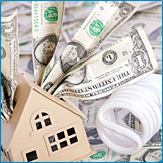
What is an Energy Efficient Mortgage?
Find Out Where YOUR Home is Losing Energy:
(Courtesy of Energy Star)
An Energy Efficient Mortgage (EEM) is a mortgage that credits a home's energy efficiency in the mortgage itself. EEMs give borrowers the opportunity to finance cost-effective, energy-saving measures as part of a single mortgage and stretch debt-to-income qualifying ratios on loans thereby allowing borrowers to qualify for a larger loan amount and a better, more energy-efficient home.
To get an EEM a borrower typically has to have a home energy rater conduct a home energy rating before financing is approved. This rating verifies for the lender that the home is energy-efficient.
EEMs are typically used to purchase a new home that is already energy efficient such as an ENERGY STAR qualified home. The term EEM is commonly used to refer to all types of energy mortgages including Energy Improvement Mortgages (EIMs), which are used to purchase existing homes that will have energy efficiency improvements made to them. EIMs allow borrowers to include the cost of energy-efficiency improvements to an existing home in the mortgage without increasing the down payment. EIMs allow the borrower to use the money saved in utility bills to finance energy improvements. Both EEMs and EIMs typically require a home energy rating to provide the lender with the estimated monthly energy savings and the value of the energy efficiency measures - known as the Energy Savings Value.
EEMs (and EIMs) are sponsored by federally insured mortgage programs (FHA and VA) and the conventional secondary mortgage market (Fannie Mae and Freddie Mac). Lenders can offer conventional EEMs, FHA EEMs, or VA EEMs.
Conventional Energy Efficient Mortgages
Conventional EEMs can be offered by lenders who sell their loans to Fannie Mae and Freddie Mac. Conventional EEMs increase the purchasing power of buying an energy efficient home by allowing the lender to increase the borrower's income by a dollar amount equal to the estimated energy savings. The Fannie Mae loan also adjusts the value of the home to reflect the value of the energy efficiency measures. For more information about Fannie Mae's EEM you can call 1-800-7FANNIE (1-800-732-6643). Visit Fannie Mae's web site to find a Fannie Mae-approved lender in your state. A PowerPoint presentation Power Point Presentation is available with more information about Freddie Mac's EEM .
FHA Energy Efficient Mortgages
FHA EEMs allow lenders to add 100 percent of the additional cost of cost-effective energy efficiency improvements to an already approved mortgage loan (as long as the additional costs do not exceed $4000 or 5 percent of the value of the home, up to a maximum of $8000, whichever is greater). No additional down payment is required, and the FHA loan limits won't interfere with the process of obtaining the EEM. FHA EEMs are available for site-built as well as for manufactured homes. Applications for an FHA EEM may be submitted to the local HUD Field Office through an FHA-approved lending institution. HUD has a searchable list of approved lenders. Information about the FHA EEM can be found on FHA's web site. Additional information is available from HUD's Office of Single Family Housing by calling (800) 569-4287. There is also a fact sheet about FHA's EEM PDF (70KB). The Systems Building Research Alliance Web site has information about FHA EEMs for ENERGY STAR qualified manufactured homes.
VA Energy Efficient Mortgages
The Veteran's Administration (VA) EEM is available to qualified military personnel, reservists and veterans for energy improvements when purchasing an existing home. The VA EEM caps energy improvements at $3,000-$6,000. Borrowers should ask their lender about a VA EEM at the beginning of the lending process. More information about VA EEMs can be obtained from the Web site for the U.S. Department of Veteran's Affairs or by calling (800) 827-1000. Chapter 7 of VA Pamphlet 26-7 (Revised) PDF (1.5MB) contains lender guidance on the VA EEM.
To learn more about EEMs contact Fannie Mae, Freddie Mac, the FHA or the VA. Additional information about writing energy-efficient mortgages can be found on the Web sites for the U.S. Department of Housing and Urban Development (HUD) and the Residential Energy Services Network (RESNET).
ENERGY STAR Mortgages
The ENERGY STAR mortgage program is demonstrates that financing can be a useful tool for enhancing the success of investing in energy-efficient homes by lowering borrowing costs, as well as demonstrating the importance of utilizing a network of qualified energy auditors and contractors to ensure that cost-effective energy efficiency improvements are realized.
This program is currently available to consumers in Maine and Colorado. Work is underway to bring the program to other states including Massachusetts, New York, New Jersey, Pennsylvania, and the District of Columbia. Homeowners and homebuyers should contact their state representatives, state energy offices, and state housing finance agencies and urge them to support the ENERGY STAR Mortgage.
The ENERGY STAR Mortgage Program reduces borrowing costs for financing the purchase of an ENERGY STAR qualified home or for financing energy efficiency improvements to an existing home being made under a Home Performance with ENERGY STAR program or a Weatherization Assistance Program and that lead to at least a 20 percent reduction in home energy use. ENERGY STAR mortgages are similar to traditional Energy Efficient Mortgages (EEMs) in that they include the cost of energy efficiency investments in the loans themselves so that borrowers can pay for those investments over the life of their loans, as well as possibly deduct the interest from their federal and state income taxes.
Home Energy Efficiency Tips:
- General Energy Saving Solutions The Energy Star Program
- Simple Energy Saving Strategies Home Insulation
- Home Assessment Overview Energy Features, Green Your Home
- Energy Efficiency Mortgages & Grants Energy Efficient Mortgage
We were unaware of what was involved in an energy audit and your audior took the time to explain everything. We were impressed with the report which told us the areas in which we need to take action on. He never pressured us to use any particular contractors, he just suggested that we go to the Building Energy Pros web site to select contractors of our own choice. He did an excellent job and we HIGHLY recommend the Building Energy Pros. We already have recommended them to several of our neighbors. Again, EXCELLENT JOB!
Cynthia Simpson
The Building Energy Pros auditor was very knowledgeable. I was VERY HAPPY with him. He promptly E-mailed my energy audit report to me and I will consider all of his recommendations.
Tom McGee
We found out that our house really has no energy problems. We are happy to know that we
Leslie Stewart
I was very satisfied with your energy auditor. He was very qualified and spent a great deal of time with me. The energy audit was very informative.
P.B.
The energy auditor was very good and helpful. He keeps in touch with me to answer any of my questions.
D.G.
I was very satisfied with my energy audit. The auditor gave me some tips on attic insulation that were very helpful.
R.G.
I was very satisfied with my energy audit. Thank you!
R.S.
Very good service! I am going to replace the windows as the auditor had suggested.
D.W.
I was very happy with the energy audit. THANKS!
A. M.
My energy audit was very helpful. Joe Dempsey, your auditor, identified some structural problems that I was not aware of and explained to me why I need more insulation.
J. F.
The auditor was EXCELLENT! He spent ALOT of time with me. I am going to take 3 to 4 of his suggestions and correct these small items to save on my energy bills.
M. B.
The auditor did a GREAT JOB! He knew a lot about older homes, which we have. The report was very comprehensive. Thank you!
Vicki Nez/at
Your energy auditor was very nice and helpful. He answered all of our questions. We will recommend Building Energy Pros to our friends and neighbors.
Katherine McCaffrey
The auditor did a TERRIFIC JOB! The report was FANTASTIC! I will make all the repairs he suggested. I will definitely recommend him to everyone I know that could benefit from a home energy audit.
Steve Sleigh, Chevy Chase
The energy auditor was very professional and I am very satisfied with both the energy audit and the report I received. I will be referring the Building Energy Pros.
Tim Clary
I was very satisfied with the auditor. He was great and gave me some very valuable information. I will refer him to people I know who may need a home energy audit.
Willie Gantt
Your home energy audit proved to be very informative and helpful. I was not aware of the updraft created inside our walls because of the balloon framing construction. You said that that can cause heat to be pulled out of the house with the draft going up inside the walls and should be re-mediated. You also said that the attic insulation was insufficient and that fiberglass batts can leave spaces for around the edges causing heat loss and that it should have blown in insulation on top of what was there to seal the whole attic and increase the r factor. After going over your findings and telling me how you would fix the problems you told me how I could do it myself with stuff from the Home Center and for a quarter of the cost. Well, I did. I went into the basement and filled the bottom of the wall joist with unfaced insulation where they set on the sill plate. I then cut one inch foam board the size for each space and set it in and the sealed the edges of that with expanding foam as well as the sill plate to the foundation. I also sealed the sill plate to the foundation where the joist ran along it, as well as the top of those joist where it made contact with the subflooring. Next I went to the home center and rented their blown insulation machine and got ten bales of the insulation. I filled the attic on top of the batt insulation with about six inches giving another r-19 factor on top of the r-19 that was there. You said that the blown in would also help seal the heat loss around the edges of the batt. The work in the basement cost $144.00 and the work in the attic cost $328.00. After the 30% federal energy tax credit it will end up costing me about $330.00, which you said I should recover in savings in the first year. Thank You for all your advice and expertise. You made me aware of things I should consider and did.
Tommy Thompson


